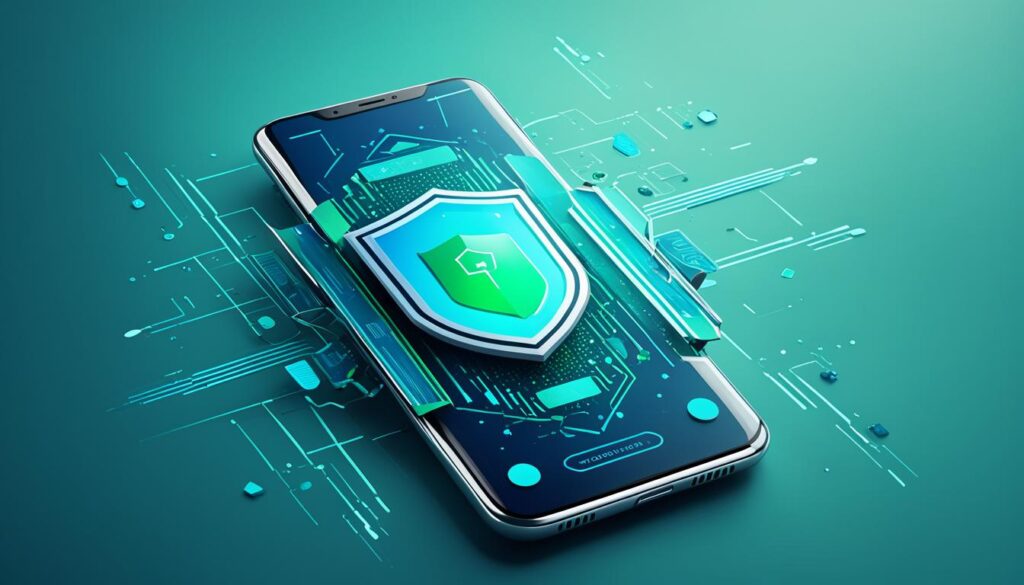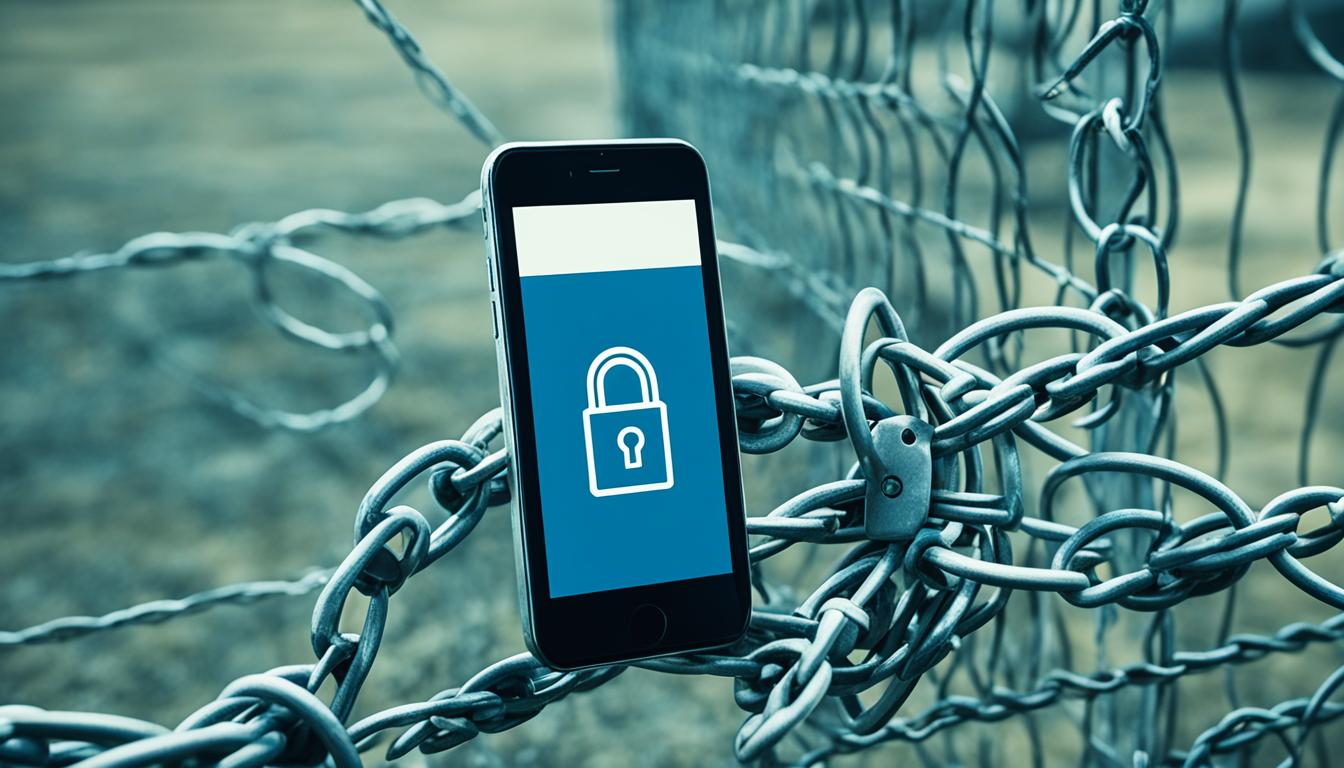In today’s digital landscape, mobile devices have become an integral part of our daily lives. From smartphones to tablets, we rely on these devices for communication, productivity, and entertainment. However, with the increasing use of mobile devices comes the heightened risk of cyber threats.
Mobile device security is crucial for individuals and organizations alike. Without proper security measures in place, sensitive data can be exposed to hackers and malicious actors. That’s why it’s important to take proactive steps to protect your mobile devices from cyberattacks.
Here are some cybersecurity tips to enhance mobile device security:
- Keep your mobile device software up to date to ensure you have the latest security patches.
- Use strong and unique passwords or passcodes for your device and individual apps.
- Avoid downloading apps from untrusted sources and only download from official app stores.
- Be cautious when clicking on email attachments or links, as they may contain phishing scams.
- Enable two-factor authentication for an additional layer of security.
By following these mobile device security best practices, you can significantly reduce the risk of falling victim to cyber threats and protect your sensitive information.
Key Takeaways
- Mobile device security is crucial in today’s digital landscape.
- Updating your device software and using strong passwords are essential for mobile device protection.
- Downloading apps from trusted sources and being cautious of phishing scams can prevent malicious attacks.
- Enabling two-factor authentication adds an extra layer of security to your mobile devices.
- Implementing these cybersecurity tips can significantly reduce the risk of falling victim to cyber threats.
The Benefits of Mobile Device Security Solutions
Mobile device security solutions play a crucial role in safeguarding company data, enhancing compliance with regulations, and minimizing the risk of data breaches. By implementing robust mobile device security software and adopting best practices, organizations can protect their valuable information, improve productivity, and maintain a competitive edge in today’s digital landscape.
“Mobile device security solutions offer numerous benefits for organizations. These solutions can protect company data from unauthorized access and theft, enhance compliance with regulations, reduce the risk of data breaches, and improve competitive advantage.”
One of the key advantages of mobile device security solutions is the ability to protect company data from unauthorized access and theft. With the growing sophistication of cyber threats, it is essential for organizations to have robust security controls in place to prevent data breaches. Mobile device security software enables organizations to enforce access controls, secure sensitive data, and protect against malicious attacks.
Furthermore, implementing mobile device security solutions enhances compliance with industry regulations. In today’s regulatory landscape, organizations must adhere to strict data protection regulations to avoid legal and financial consequences. Mobile device security software provides the necessary tools to meet compliance requirements, such as encryption, secure data storage, and user authentication.
Reducing the risk of data breaches is another significant benefit of mobile device security solutions. Data breaches can result in significant financial losses, reputational damage, and legal issues. By implementing mobile device security software, organizations can detect and respond to potential threats in real-time, minimizing the impact of data breaches and ensuring the confidentiality and integrity of sensitive information.
Implementing mobile device security software allows for improved security controls, automated device registration, data backup, and remote device management.
Moreover, mobile device security solutions can provide organizations with a competitive advantage. In today’s interconnected world, customers and partners expect their data to be protected when interacting with organizations. Demonstrating a commitment to data security and privacy can differentiate organizations from their competitors and build trust with stakeholders.
By adopting best practices for mobile device security, organizations can maximize the benefits of mobile device security solutions. Best practices include regularly updating software and operating systems, educating employees about potential threats, implementing strong password policies, and conducting regular security audits. These practices ensure that organizations stay ahead of emerging security risks and maintain a strong defense against cyber threats.
Stay Protected with Mobile Device Security Software
Protecting sensitive data, enhancing compliance, reducing the risk of data breaches, and gaining a competitive advantage are all achievable with mobile device security solutions. By implementing robust mobile device security software and adopting best practices, organizations can safeguard their valuable assets and ensure a secure digital environment for their employees and customers.

Continue reading to learn about the strategies for mobile device security and the challenges and solutions associated with Bring Your Own Device (BYOD) policies.
Strategies for Mobile Device Security
To enhance mobile device security, organizations should implement a series of strategies to safeguard valuable data and protect against potential threats. By establishing clear policies, educating employees about risks, and utilizing advanced security measures, organizations can strengthen the security of their mobile devices and mitigate the risks associated with cyberattacks.
Clear Policies and Processes
Establishing clear policies and processes is a crucial step in improving mobile device security. By clearly defining rules and guidelines for the use of company devices, organizations can ensure consistent security practices. These policies should include:
- Enforcing Unique Passwords: Employees should use strong, unique passwords for each company account to minimize the risk of unauthorized access.
- Regular Device Updates: Employees should be informed about the importance of keeping their devices updated with the latest security patches and software updates.
Educating Employees about Risks
Education plays a vital role in maintaining mobile device security. By educating employees about the risks associated with downloading malicious apps or accessing unsecured Wi-Fi networks, organizations can empower their workforce to make informed decisions and avoid potential security breaches.
“Educating employees about the risks of downloading malicious apps and accessing unsecured Wi-Fi networks is essential. By raising awareness and promoting a security-conscious culture, organizations can significantly mitigate the threat landscape.” – Security Expert
Implementing Mobile Device Encryption
Mobile device encryption is a critical security measure that organizations can employ to protect sensitive data from unauthorized access. By encrypting data stored on mobile devices, organizations can ensure that even if a device is lost or stolen, the data remains encrypted and inaccessible to unauthorized individuals.
Utilizing Secure Mobile Apps
Utilizing secure mobile apps is another effective strategy for enhancing mobile device security. By using apps from trusted sources and verifying their security features, organizations can minimize the risk of installing malicious apps that could compromise device security.
Implementing Endpoint Protection Measures
Endpoint protection measures provide an additional layer of security for mobile devices. By implementing solutions such as secure VPNs, firewalls, and antivirus software, organizations can safeguard devices from external threats and potential malware infections.
By following these strategies and integrating them into their mobile device security practices, organizations can significantly improve the overall security posture of their mobile devices, protecting sensitive data and reducing the risk of cyberattacks.

BYOD and Mobile Device Security
Bring Your Own Device (BYOD) policies offer flexibility and increased access to organizational resources, but they also introduce security and privacy challenges. To mitigate these risks, it is crucial for organizations to implement solutions that enhance security and privacy in Android and Apple mobile device BYOD deployments.
One effective approach is to utilize standards-based, commercially available products that provide robust security features. These products can help protect sensitive data and mitigate the risks associated with BYOD. Implementing encryption, access controls, and two-factor authentication are essential security measures to safeguard company information.
In particular, Android mobile device security should focus on implementing strong encryption protocols and utilizing app vetting processes. With the diverse range of Android devices in the market, it is important to ensure compatibility and security across different models.
Similarly, Apple mobile device security can be enhanced by implementing device management solutions that enable centralized control and secure device configurations. Emphasizing the use of trusted app sources and ensuring regular updates are vital for maintaining the security of Apple devices.
By adopting robust security measures, organizations can protect sensitive data and mitigate the risks associated with BYOD policies. It is essential to prioritize security and privacy in Android and Apple mobile device BYOD deployments to ensure the integrity and confidentiality of company information.
Key Considerations for BYOD Deployments:
- Implement strong encryption protocols to protect data on mobile devices.
- Utilize access controls and two-factor authentication for enhanced security.
- Establish clear policies regarding app usage and app vetting processes.
- Regularly update devices and encourage users to download updates promptly.
- Consider implementing device management solutions for centralized control and secure configurations.
Advantages of BYOD:
While BYOD introduces security challenges, it also offers several advantages for organizations:
- Increased employee satisfaction and productivity due to familiarity with personal devices.
- Cost savings for organizations by reducing the need to purchase and maintain company-owned devices.
- Improved flexibility and accessibility, allowing employees to work from anywhere using their preferred devices.
Disadvantages of BYOD:
However, it is essential to consider the potential disadvantages of BYOD:
- Security and privacy concerns, including the risk of data breaches and unauthorized access.
- Device compatibility issues and the need to support a diverse range of mobile devices.
- Increased complexity in managing and securing corporate data on personal devices.
Comparison of Android and Apple Mobile Device Security
| Security Aspect | Android | Apple iOS |
|---|---|---|
| App Security | App vetting process with Google Play Protect | Strict app review process, limited to the App Store |
| Encryption | Various encryption options available | Strong encryption by default |
| Device Management | Wide range of third-party solutions available | Comprehensive device management capabilities |
| Updates | Device-dependent, updates determined by manufacturers | Prompt and regular updates provided by Apple |
Overall, organizations adopting a BYOD policy must prioritize security and take appropriate measures to protect company data on Android and Apple devices. This includes implementing encryption, access controls, and regular updates, while also educating employees about the importance of maintaining mobile device security.

Conclusion
In today’s digital landscape, mobile device security is crucial for organizations to protect their data and ensure overall organizational security. With the continued growth in mobile device usage, it is essential that organizations prioritize the implementation of robust mobile device security measures.
By adopting best practices for mobile device security and utilizing mobile device security solutions, organizations can significantly improve their cybersecurity posture. It is crucial to stay updated on the latest threats and vulnerabilities to effectively mitigate the risks associated with cyberattacks.
Incorporating mobile device security into business strategies not only helps protect sensitive data but also ensures compliance with regulatory requirements. This is especially important in industries that handle personal and financial information.
By implementing strong mobile device security measures, organizations can safeguard their data, maintain compliance, and mitigate potential risks. Prioritizing mobile device security is essential for the overall security and success of organizations in today’s interconnected digital world.
FAQ
Why is mobile device security important?
Mobile device security is important because it helps protect sensitive data and ensures compliance with regulations. It also reduces the risk of data breaches and improves overall productivity.
What benefits do mobile device security solutions offer?
Mobile device security solutions offer benefits such as protecting company data from unauthorized access and theft, enhancing compliance with regulations, reducing the risk of data breaches, and improving competitive advantage.
How can organizations enhance mobile device security?
Organizations can enhance mobile device security by establishing clear policies and processes, enforcing the use of unique passwords, educating employees about the risks of downloading malicious apps, implementing mobile device encryption, utilizing secure mobile apps, and implementing endpoint protection measures.
What should organizations consider when implementing BYOD policies?
When implementing BYOD policies, organizations should consider using standards-based, commercially available products, implementing encryption, access controls, and two-factor authentication, and paying attention to the diverse range of devices used and the level of risk they pose.








